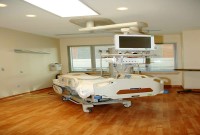- Home
- Business Processes
- Industry Knowledge
- Aerospace Industry
- Automotive Industry
- Banking Domain
- BFSI Industry
- Consumer/ FMCG Industry
- Chemicals Industry
- Engineering & Construction
- Energy Industry
- Education Domain
- Finance Domain
- Hospitality Domain
- Healthcare Industry
- Insurance Domain
- Retail Industry
- Travel and Tourism Domain
- Telecom Industry
- Leadership Skills
- eLearning
- Home
- Industry Knowledge
- Healthcare Industry
- Different Types of Hospitals
Different Types of Hospitals
This article briefly describes what we mean by the term hospitals; classify them based on their funding and on the basis of services offered by them. Get an understanding of various departments in hospitals and get an introduction to various types of hospitals including General Medical & Surgical Hospitals, Specialty Hospitals, Teaching Hospitals, Clinics, Psychiatric Hospitals, Family Planning & Abortion Clinics, Hospices & Palliative Care Centers, Emergency & Other Outpatient Care Centers, Sleep Disorder Clinics, etc.
What is a Hospital?
Hospitals were original "places of hospitality" and it is a health care institution providing patient treatment by specialized staff and equipment. In cities, towns, and villages throughout the world, hospitals are a key part of any health care delivery system. Hospitals respond to the health care challenges in their communities, by providing prevention and cure to diseases, through largely staffed professional physicians, surgeons, and nurses.
What are the various departments in a hospital?
Hospitals offer a variety of services and therefore have departments, which are also known as "wards". Each is usually headed by a Chief Physician and can be backed up by more specialist units such as:
- Emergency department
- Cardiology department
- Intensive care unit
- Pediatric intensive care unit
- Neonatal intensive care unit
- Cardiovascular intensive care unit
- Neurology
- Oncology
- Obstetrics and gynecology
- Outpatient departments
- Behavioral health services
- Dentistry
- Dermatology
- Psychiatric ward
- Rehabilitation services
- Physical therapy
- Dispensary or pharmacy
- Pathology
- Radiology
- Medical records department
- Information Management
- Clinical Engineering
- Facilities Management
Types of Hospitals:
Hospitals are usually funded by the public sector, by health organizations (for-profit or nonprofit), health insurance companies, or charities, including direct charitable donations. Hospitals may fall into one of three categories based on their funding:
- Publicly owned hospitals
- Nonprofit hospitals
- For-profit hospitals
Hospitals can be further classified based on the treatment provided by them(indicative) or in terms of facilities offered by the as:
- General Medical & Surgical Hospitals
- Specialty Hospitals
- Teaching Hospitals
- Clinics
- Psychiatric Hospitals
- Family Planning & Abortion Clinics
- Hospices & Palliative Care Centers
- Emergency & Other Outpatient Care Centers
- Sleep Disorder Clinics
- Dental Laboratories
- Blood & Organ Banks
General Medical & Surgical Hospitals:
The best-known type of hospital is the general hospital, which is set up to deal with many kinds of disease and injury, and normally has an emergency department to deal with immediate and urgent threats to health.
Specialty Hospitals:
Specialty hospitals provide care for a specific specialty and tailor their care and facilities to fit the chosen type of condition, patient, or procedure on which they focus. Types of specialized hospitals include trauma centers, rehabilitation hospitals, children's hospitals, seniors' (geriatric) hospitals, and hospitals for dealing with specific medical needs such as psychiatric problems (see psychiatric hospital), certain disease categories such as cardiac, oncology, or orthopedic problems, and so forth.
Teaching Hospitals:
Some hospitals are affiliated with universities for medical research and the training of medical personnel such as physicians and nurses, often called teaching hospitals. A teaching hospital combines assistance to patients with teaching to medical students and nurses and often is linked to a medical school, nursing school, or university.
Clinics:
The medical facility smaller than a hospital is generally called a clinic and often is run by a government agency for health services or a private partnership of physicians (in nations where private practice is allowed). Clinics generally provide only outpatient services.
Psychiatric Hospitals:
Psychiatric hospitals, also known as mental hospitals, are hospitals specializing in the treatment of serious mental disorders. This industry includes establishments licensed to provide diagnostic, medical treatment, and monitoring services for inpatients who suffer from mental illness or substance abuse disorders. These establishments maintain inpatient beds and a staff of physicians. Facilities that emphasize counseling for mental health and substance abuse rather than medical treatment are not included in the industry.
Family Planning & Abortion Clinics:
Family planning is the planning of when to have children, and the use of birth control and other techniques to implement such plans. This industry includes freestanding centers with medical staff primarily engaged in assisting pregnant women and families in making various decisions regarding family planning. Services are provided on an outpatient basis and include contraception, genetic and prenatal counseling, voluntary sterilization, and pregnancy termination.
Hospices & Palliative Care Centers:
This industry provides programs that offer symptom relief and pain management for patients with life-terminating illnesses. Hospice care applies to companies that administer care (in terms of comfort rather than cure) to patients with life-limiting illnesses or diseases. Non-hospice palliative care is provided to individuals with serious, complex illnesses, whether they are expected to recover fully.
Emergency & Other Outpatient Care Centers:
This industry includes establishments with medical staff primarily engaged in providing emergency, general, or specialized outpatient care not included in other industries. Centers or clinics of health practitioners with different degrees for use in more than one industry practicing within the same establishment (e.g. doctor of medicine and doctor of dental medicine) are included in this industry.
Sleep Disorder Clinics:
This industry includes facilities that are devoted to the diagnosis and care of outpatients with disorders that affect, disrupt, or more generally involve sleep. Common sleep disorders include insomnia, sleep apnea, restless leg syndrome, and sleepwalking. Industry firms are often associated with hospitals or medical schools.
Dental Laboratories:
Dental laboratories manufacture or customize a variety of products to assist in the provision of oral health care by a licensed dentist. This industry comprises establishments that manufacture dentures, crowns, bridges, and orthodontic products customized for individual applications as prescribed by licensed dentists.
Blood & Organ Banks:
Organ donation is the donation of biological tissue or an organ of the human body, from a living or dead person to a living recipient in need of a transplantation. This industry includes companies that are primarily engaged in collecting, storing, and distributing blood, blood products, and body organs.
Related Links
You May Also Like
-
This article provides insightful industry analysis and research into the specialty hospital industry. This article discusses the definition, key industry products, and activities along with major industry trends. Understand the revenue model, a brief history of trends during the current century, and key challenges currently being faced by the specialty hospital industry.
-
This article provides insightful industry analysis and research into the Blood & Organ Banks industry. This article discusses the definition, key industry products, and activities along with major industry trends. Understand the revenue model, a brief history of trends during the current century, and key challenges currently being faced by the Blood & Organ Banks industry.
-
Hospices & Palliative Care Centers
This article provides insightful industry analysis and research into the Hospices & Palliative Care Centers industry. This article discusses the definition, key industry products, and activities along with major industry trends. Understand the revenue model, a brief history of trends during the current century, and key challenges currently being faced by the Hospices & Palliative Care Centers industry.
-
History of Healthcare Industry
This article provides a short history of healthcare industry and discusses major world events that impacted and shaped the healthcare industry as it stands today. This article briefly traces global healthcare history from ancient times to the colonial era to the modern-day. This article also discusses various ideologies that have dictated the path of global health and set the trend towards globalization of the healthcare sector.
-
This article provides insightful industry analysis and research into the Sleep Disorder Clinics industry. This article discusses the definition, key industry products, and activities along with major industry trends. Understand the revenue model, a brief history of trends during the current century, and key challenges currently being faced by the Sleep Disorder Clinics industry.
-
Emergency & Other Outpatient Care Centers
This article provides insightful industry analysis and research into the Emergency & Other Outpatient Care Centers industry. This article discusses the definition, key industry products, and activities along with major industry trends. Understand the revenue model, a brief history of trends during the current century, and key challenges currently being faced by the Emergency & Other Outpatient Care Centers industry.
-
Sectors of Healthcare Industry
The healthcare industry provides a variety of services to support the healthcare needs of a community or individuals. A universally agreed-upon classification of sectors does not exist, but the key sectors of the healthcare industry can be broadly classified into four sectors called 'Health care services and facilities', 'Medical devices, equipment, and hospital supplies manufacturers', Medical insurance, medical services and managed care' and 'Pharmaceuticals & Related Segments".
-
This article briefly describes what we mean by the term hospitals; classify them based on their funding and on the basis of services offered by them. Get an understanding of various departments in hospitals and get an introduction to various types of hospitals including General Medical & Surgical Hospitals, Specialty Hospitals, Teaching Hospitals, Clinics, Psychiatric Hospitals, Family Planning & Abortion Clinics, Hospices & Palliative Care Centers, Emergency & Other Outpatient Care Centers, Sleep Disorder Clinics, etc.
-
Mental health and residential developmental handicap facilities
This article provides insightful industry analysis and research into the Mental health and residential developmental handicap facilities industry. This article discusses the definition, key industry products, and activities along with major industry trends. Understand the revenue model, a brief history of trends during the current century, and key challenges currently being faced by the Mental health and residential developmental handicap facilities industry.
-
This article provides insightful industry analysis and research into the Nursing Care Facilities industry. This article discusses the definition, key industry products, and activities along with major industry trends. Understand the revenue model, a brief history of trends during the current century, and key challenges currently being faced by the Nursing Care Facilities industry.
Explore Our Free Training Articles or
Sign Up to Start With Our eLearning Courses

About Us
Learning
© 2023 TechnoFunc, All Rights Reserved








